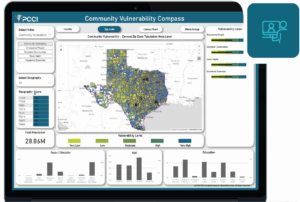
Dallas County Launches New Diabetes and Hypertension Surveillance Systems
DALLAS – On September 10, 2025, Dallas County Health and Human Services (DCHHS), in collaboration with Parkland Health and the Parkland Center for Clinical Innovation (PCCI), launched the Diabetes and Hypertension Surveillance Systems, which are powerful new tools designed to track and better understand diabetes and hypertension across Dallas County.
The systems will feature publicly accessible dashboards, available on the DCHHS Chronic Disease Prevention webpage, offering timely, reliable data to inform community health strategies, research, and public policy. The surveillance systems integrate multiple data sources to provide insight into key indicators and their impact by zip code or census tract:
-Clinical indicators such as ED visit, obesity, A1c measure, missed BP measure, etc.
-Social determinants of health indicators including education and literacy, household income, disease burden, food insecurity, etc.
-Other indicators such as “number of diabetes prescription fills in the past 3 months, etc.
The dashboards will allow users to explore population data by age, sex, race/ethnicity, and education, giving residents, providers, and policymakers a clearer picture of diabetes and hypertension vulnerabilities and patterns in Dallas County.
“The launch of our new diabetes and hypertension surveillance systems represents a major milestone in strengthening our public health response,” said Dr. Philip Huang, MD, MPH, DCHHS Director/Health Authority. “By combining clinical data with social and demographic information, we can better identify at-risk populations, guide policy, and ensure that prevention and treatment efforts reach those who need them most.”
“It takes a connected community to support the health and wellness of our region, and these AI-driven dashboards provide comprehensive, hyper-localized insights into the risks and underlying factors of some of the most prevalent and harmful chronic conditions. These insights and data are critical to coordinate support and align interventions for maximum impact and we’re excited to make these available to the whole community.”
Steve Miff, PhD, CEO at PCCI
“The creation of this dashboard has brought together the non-medical drivers of health and clinical diabetes data to allow us to both understand what is going on in our communities and how to create a multi-pronged approach to address it,” said Uma Gunasekaran, MD, Endocrinologist and Executive Medical Director of Parkland’s Global Diabetes Center. “This is great information for our health systems but also for the public to see as well.”
For more information and to access the dashboards, visit the DCHHS Chronic Disease Prevention webpage at https://www.dallascounty.org/departments/dchhs/public-health/chronic-disease/.
###





